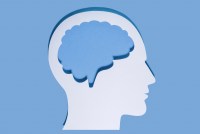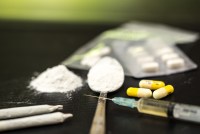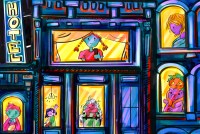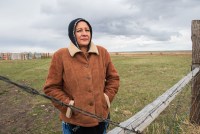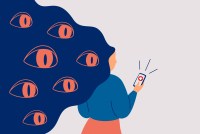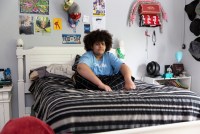Latest Morning Briefing Stories
Las disposiciones de la nueva ley de armas y salud mental
La ley de seguridad de armas forjada a través de tensas conversaciones bipartidistas en el Senado se presentó como la primera legislación federal en 30 años para combatir el aumento de la violencia armada. Pero lo que ha pasado desapercibido es uno de sus objetivos clave: mejorar los servicios de salud mental.
Gun Safety ‘Wrapped in a Mental Health Bill’: A Look at Health Provisions in the New Law
The bulk of the funds provided in the gun reform law known as the Bipartisan Safer Communities Act are for expanding mental health services. Will it help improve mental health outcomes and stem violence?
California May Require Labels on Pot Products to Warn of Mental Health Risks
Doctors and lawmakers in California want cannabis products labeled to warn consumers of the increased risk of schizophrenia and other disorders associated with heavy use.
Overdose Deaths Behind Bars Rise as Drug Crisis Swells
Drug-related mortality rates have increased in prisons and jails even as the number of people incarcerated for drug offenses has dropped. The pandemic lockdowns on visitors didn’t eliminate the problem, showcasing that guards have been a source of the contraband.
Journalists Investigate Private Equity, Medical Debt, and Mental Health Care
KHN and California Healthline staff made the rounds on national and local media this week to discuss their stories. Here’s a collection of their appearances.
KHN’s ‘What the Health?’: The FDA Goes After Nicotine
The FDA is using its power to regulate tobacco products — ordering the vaping device Juul off the market and announcing its intention to lower the amount of nicotine in cigarettes and other products. Meanwhile, the Supreme Court rules on Medicare and kidney dialysis, and Congress makes progress on legislation surrounding guns and mental health. Joanne Kenen of the Johns Hopkins Bloomberg School of Public Health and Politico, and Rachel Cohrs of Stat join KHN’s Julie Rovner to discuss these issues and more. Also this week, Rovner interviews KHN’s Noam N. Levey about the new KHN-NPR project on the growing impact of medical debt.
Senate Deal Raises Hopes for a Reduction in Gun Suicides
A bipartisan U.S. Senate agreement on guns that focuses on mental health raises hopes and doubts in rural Western states with high suicide rates and easy access to guns.
KHN’s ‘What the Health?’: Closing In on Covid Vaccines for ‘The Littles’
The wait is nearly over for parents of kids under 5 as a key advisory committee to the FDA recommends authorizing a covid-19 vaccine for the youngest children. Meanwhile, Congress is struggling to fill in the details of its gun control compromise, and, as the Supreme Court prepares to throw the question of abortion legality back to the states, the number of abortions has been rising. Shefali Luthra of The 19th, Sarah Karlin-Smith of the Pink Sheet, and Sandhya Raman of CQ Roll Call join KHN’s Julie Rovner to discuss these issues and more. Plus, for extra credit, the panelists recommend their favorite health policy stories of the week they think you should read, too.
States Fight Student Mental Health Crisis With Days Off
In early 2022, Illinois joined a growing number of states where lawmakers and school leaders are trying to combat the ongoing student mental health crisis by granting days off for mental health needs.
Long Wait for Justice: People in Jail Face Delays for Mental Health Care Before They Can Stand Trial
People in jail who have serious mental illness and cannot stand trial because of their condition are waiting months, or even more than a year, to get into their state psychiatric hospitals.
KHN’s ‘What the Health?’: Taking a Shot at Gun Control
The U.S. House passed a package of bills seeking to keep some guns out of the hands of children and teenagers, but its fate in the Senate remains a big question mark. Meanwhile, the Federal Trade Commission takes on drug and hospital prices. Alice Miranda Ollstein of Politico, Anna Edney of Bloomberg News, and Joanne Kenen of the Johns Hopkins Bloomberg School of Public Health and Politico join KHN’s Julie Rovner to discuss these issues and more. Also this week, Rovner interviews Cori Uccello of the American Academy of Actuaries about the most recent report from Medicare’s trustees board.
Patients Seek Mental Health Care From Their Doctor but Find Health Plans Standing in the Way
Despite a consensus that patients should be able to get mental health care from primary care doctors, insurance policies and financial incentives may not support that.
‘Desperate Situation’: States Are Housing High-Needs Foster Kids in Offices and Hotels
Some foster children with complex mental, behavioral, and physical health needs without a foster placement are having to stay in hotel rooms and even office buildings, a practice called “hoteling.”
KHN’s ‘What the Health?’: A(nother) Very Sad Week
Two mass shootings in two weeks — one at a Texas elementary school that killed 19 fourth graders and two teachers — have reignited the “guns-as-public-health-problem” debate. But political consensus seems as far away as ever. Meanwhile, the FDA is in the congressional hot seat over its handling of the infant formula shortage. Joanne Kenen of the Johns Hopkins Bloomberg School of Public Health and Politico, Anna Edney of Bloomberg News, and Rachana Pradhan of KHN join KHN’s Julie Rovner to discuss these issues and more. Also this week, Rovner interviews Dr. Richard Baron, head of the American Board of Internal Medicine, about how doctors should discipline colleagues who spread medical misinformation.
The Blackfeet Nation’s Plight Underscores the Fentanyl Crisis on Reservations
The deadly synthetic opioid has spread across the nation during the pandemic, and the problem is disproportionately affecting Native Americans.
Journalists Explore Affordability of Mental Health Care and Abortion Laws’ Effect on Miscarriages
KHN and California Healthline staff made the rounds on national and local media this week to discuss their stories. Here’s a collection of their appearances.
The Private Sector Steps In to Protect Online Health Privacy, but Critics Say It Can’t Be Trusted
Health data can be shockingly available. A group of nonprofits and corporations is proposing to patch up the holes in health apps, but many of the biggest companies didn’t participate in the proposal’s creation.
KHN and California Healthline staff made the rounds on national and local media this week to discuss their stories. Here’s a collection of their appearances.
National Addiction Treatment Locator Has Outdated Data and Other Critical Flaws
Three years after a government site launched to connect Americans to treatment, finding addiction care is still a struggle.
The Families of Trans Kids in Texas Consider Their Options Amid Crackdown on Care
After Texas limited transgender medical care for young people, patients are trying to figure out what’s next.



